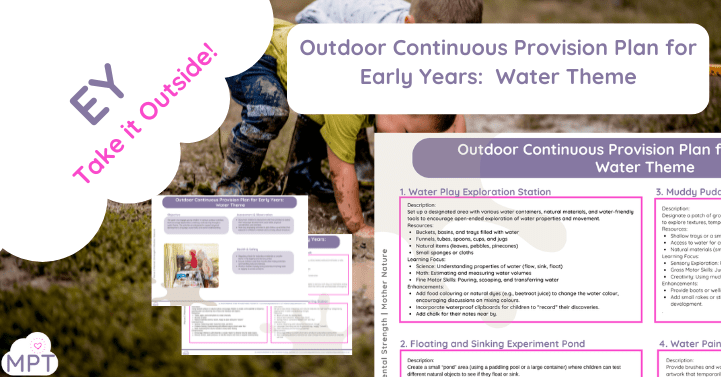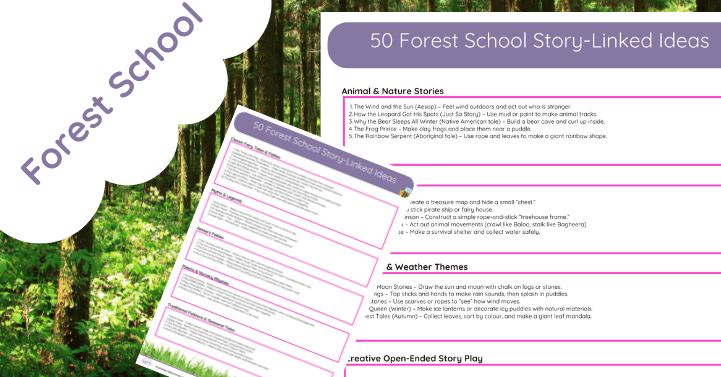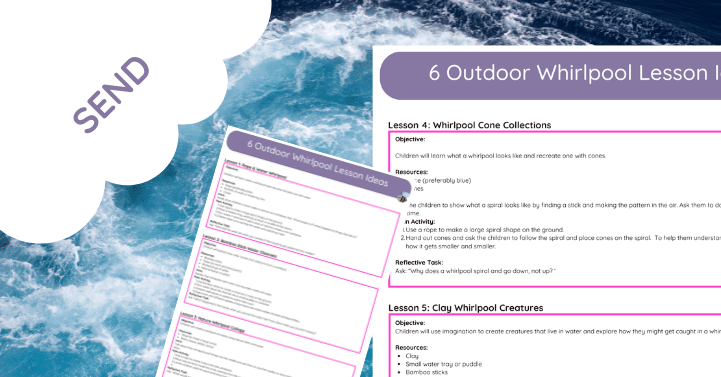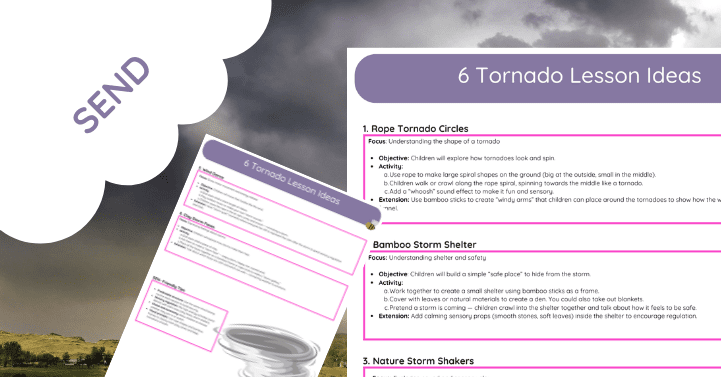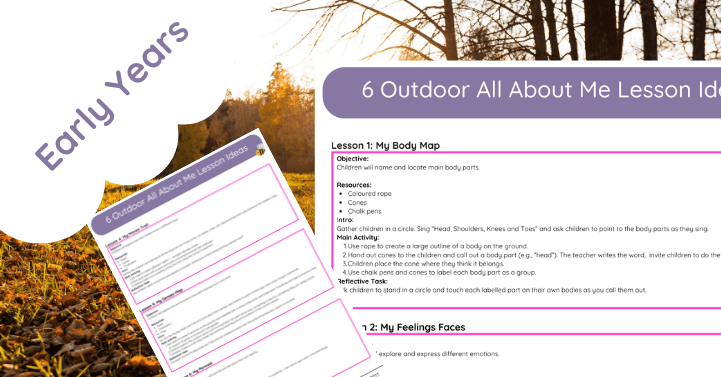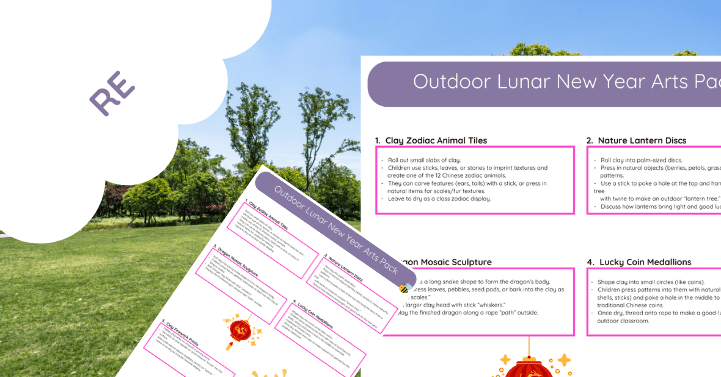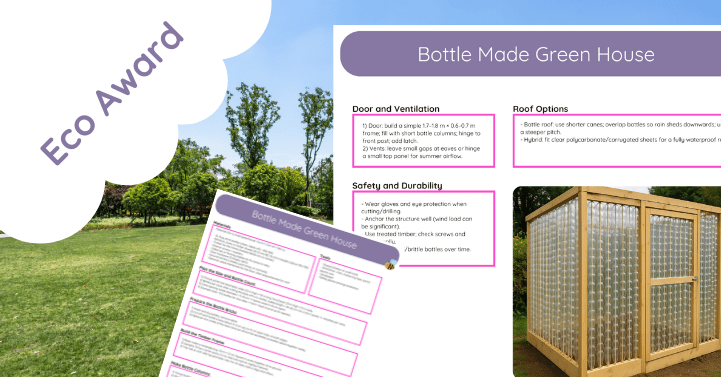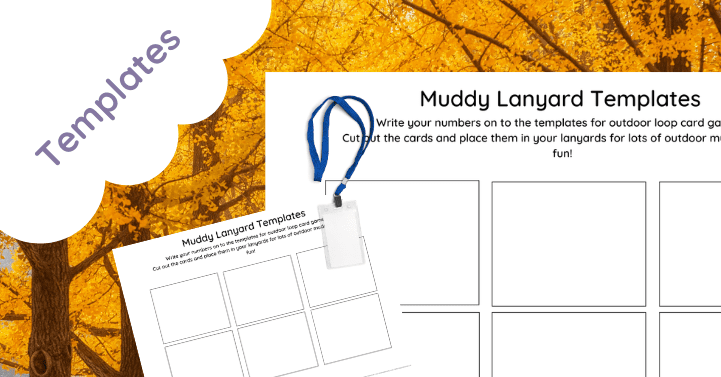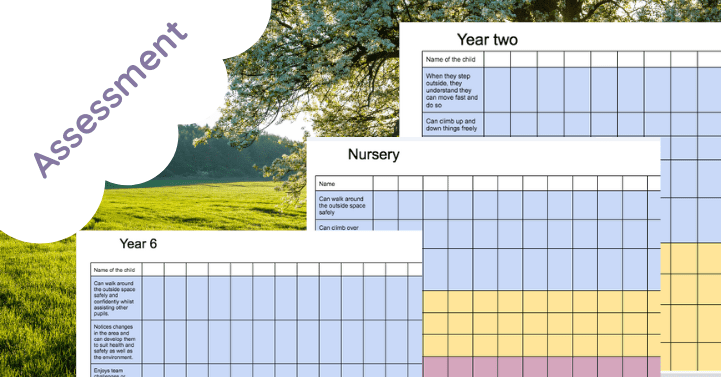Product Description: Outdoor Continuous Provision Plan for Early Years: Water Theme (MPT Approach)
Bring the wonder of water to life in your outdoor setting with our Outdoor Continuous Provision Plan for Early Years: Water Theme, designed to engage young learners in sensory-rich, hands-on activities through the MPT Approach (Materials, Preparation, Teaching). This plan offers a variety of open-ended, child-led activities that explore the properties of water, encourage curiosity, and develop early scientific and mathematical skills—all while children have fun splashing, pouring, and experimenting!
Materials
The Water Theme Plan includes simple, accessible materials that make water exploration easy and enjoyable. With buckets, basins, natural items (like leaves, stones, and sticks), and water-friendly tools, children can dive into activities that foster fine and gross motor skills, sensory exploration, and creative play. The materials are designed to be versatile and reusable, supporting a sustainable approach to outdoor learning.
Preparation
Each activity in the Water Theme Plan includes straightforward setup instructions, allowing educators to organize activities quickly with minimal prep. The plan provides clear guidance on creating stations for activities like Floating and Sinking Experiments, Water Painting, and Muddy Puddle Exploration, ensuring children can interact with water safely and independently. Activities are designed to be flexible, so educators can easily adapt based on available outdoor space, group size, and weather conditions.
Teaching
The Water Theme Plan emphasizes playful, experiential learning, encouraging children to take the lead and explore water in their own way. Children develop early math, science, and problem-solving skills through hands-on activities like creating mini waterfalls, water relays, and floating boats. Educators are supported with teaching prompts and questions to extend children’s learning, encouraging deeper thinking about concepts like buoyancy, measurement, and the natural water cycle.
Why Choose the Water Theme Plan?
- Child-Led Exploration: Open-ended activities allow children to explore water independently, building confidence and curiosity.
- Holistic Development: Supports a range of skills, from sensory and motor skills to early math and science understanding.
- Eco-Friendly & Sustainable: Encourages outdoor learning using natural, reusable materials aligned with eco-friendly practices.
- Flexible & Adaptable: Easily modified to suit different ages, group sizes, and outdoor spaces.
Designed to foster a love for nature and discovery, the Outdoor Continuous Provision Plan for Early Years: Water Theme is perfect for early years educators looking to enrich their outdoor provision with engaging, water-based learning experiences.
Exploring Outdoor Continuous Provision with a Water Theme Using the MPT Approach
Outdoor continuous provision offers young learners a wonderful opportunity to explore, discover, and learn through play in a natural environment. By setting up a water-themed outdoor continuous provision, educators can harness the power of water to engage children in a hands-on, sensory-rich experience that builds foundational skills in science, math, and fine motor development. Using the MPT Approach (Materials, Preparation, Teaching), we’ll break down how to set up and make the most of a water-themed provision. This approach ensures that each activity is well-prepared, resourceful, and designed to encourage exploration and curiosity.
The Importance of Outdoor Learning in Early Years
Studies show that outdoor learning helps children develop socially, physically, and cognitively in ways that are hard to achieve indoors. By creating an outdoor classroom, we allow young learners to experience a change of scenery and to develop a natural curiosity about the world around them. According to the Children & Nature Network Research Library, outdoor experiences lead to improved focus, increased physical activity, and greater overall well-being, especially for early years learners. Outdoor continuous provision ensures that children can explore independently, encouraging a child-led approach to learning.
What is the MPT Approach?
The MPT Approach is a simple but effective way to set up continuous provision:
- Materials: Gather various accessible, versatile materials to stimulate sensory and practical learning.
- Preparation: Organize resources and activity spaces to ensure children can easily explore.
- Teaching: Engage and guide children’s exploration with prompts and questions that foster learning while allowing freedom to play.
This approach ensures that each activity is easy to set up, engaging, and educational, providing structure without limiting children’s natural curiosity.
Setting Up a Water-Themed Continuous Provision
Let’s dive into a few water-themed activities that align with the MPT Approach and bring the magic of water to your outdoor classroom.
1. Floating and Sinking Experiment Station
Materials: Large containers of water, natural items (sticks, leaves, stones), and waterproof toys.
Preparation: Set up the containers at child height with a collection of objects nearby.
Teaching: Ask children to predict if each item will float or sink before testing it in the water.
This activity taps into early science skills as children make predictions, test them, and observe the results. Floating and sinking activities help young learners develop critical thinking skills and understand basic physics concepts. Scholastic provides additional tips on conducting simple science experiments with early-year learners that can extend this activity.
2. Water Painting on Pavement
Materials: Paintbrushes, sponges, rollers, containers of water, and a paved surface.
Preparation: Set out paintbrushes and sponges with water in a central outdoor location.
Teaching: Encourage children to create patterns, shapes, or even letters, explaining that water will eventually evaporate, “erasing” their creations.
This activity allows children to express themselves creatively while observing the natural evaporation process. Through water painting, children can explore shapes, letters, and patterns pressure-free, reinforcing early literacy and fine motor skills. For more on the benefits of creative outdoor learning, check out Learning Through Landscapes, a fantastic resource for outdoor learning ideas.
3. Water Relay Challenge
Materials: Small containers, buckets, sponges, and measuring cups.
Preparation: Set up a relay course with buckets at the start and end. Place sponges and containers along the course so that children can transfer water from one bucket to another.
Teaching: Challenge children to move water using sponges or small cups, observing which method is quickest and most effective.
Water relay races help develop physical coordination and teamwork while allowing children to explore concepts of volume and measurement hands-on. Relay challenges can be adapted for different ages and skill levels, making them a versatile addition to any outdoor provision. Play England emphasizes the importance of active play in early childhood for building physical and social skills.


